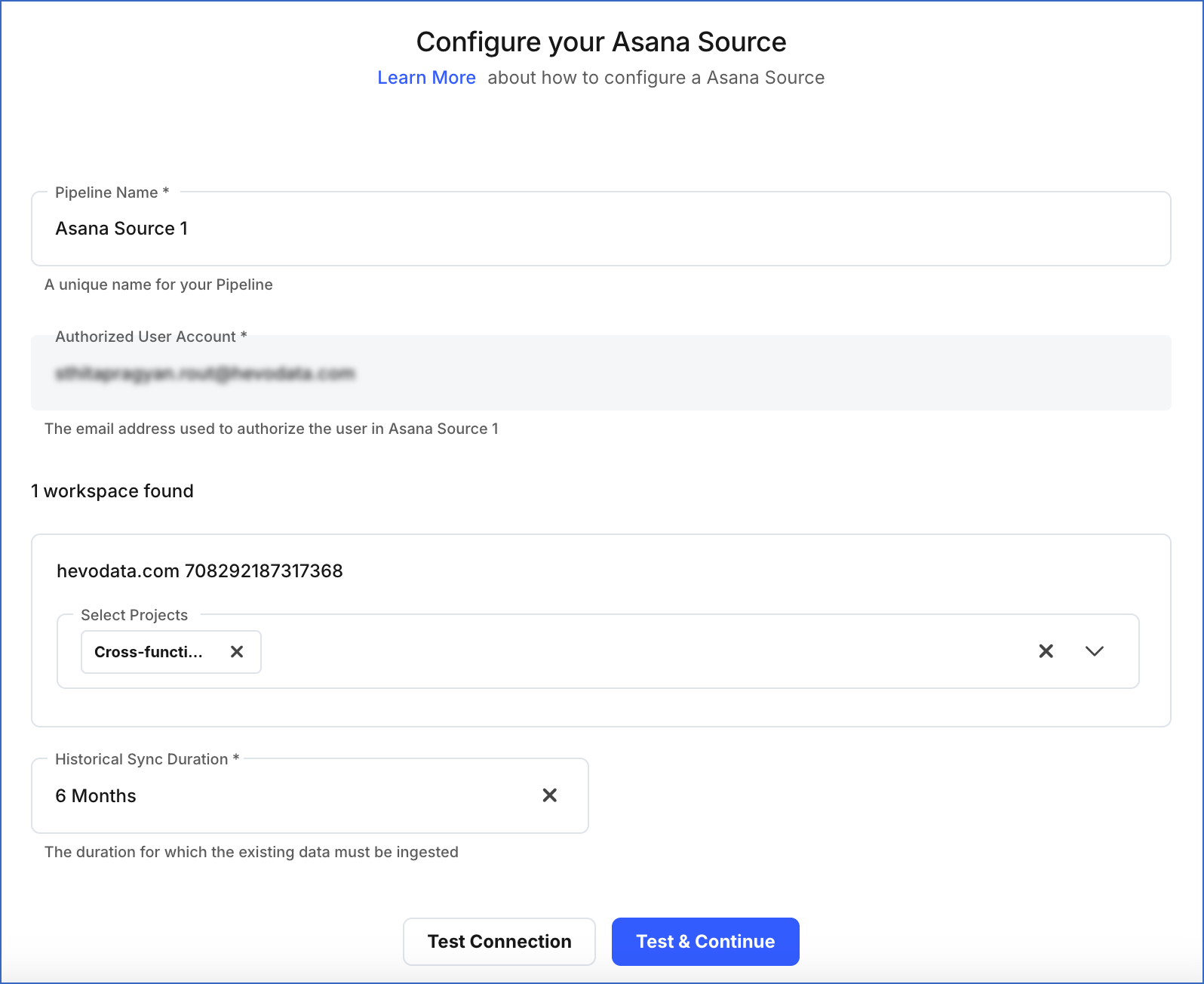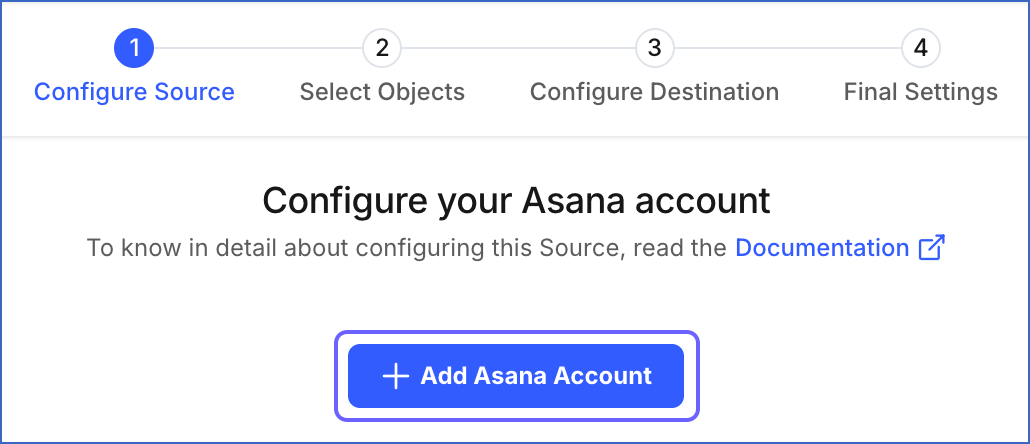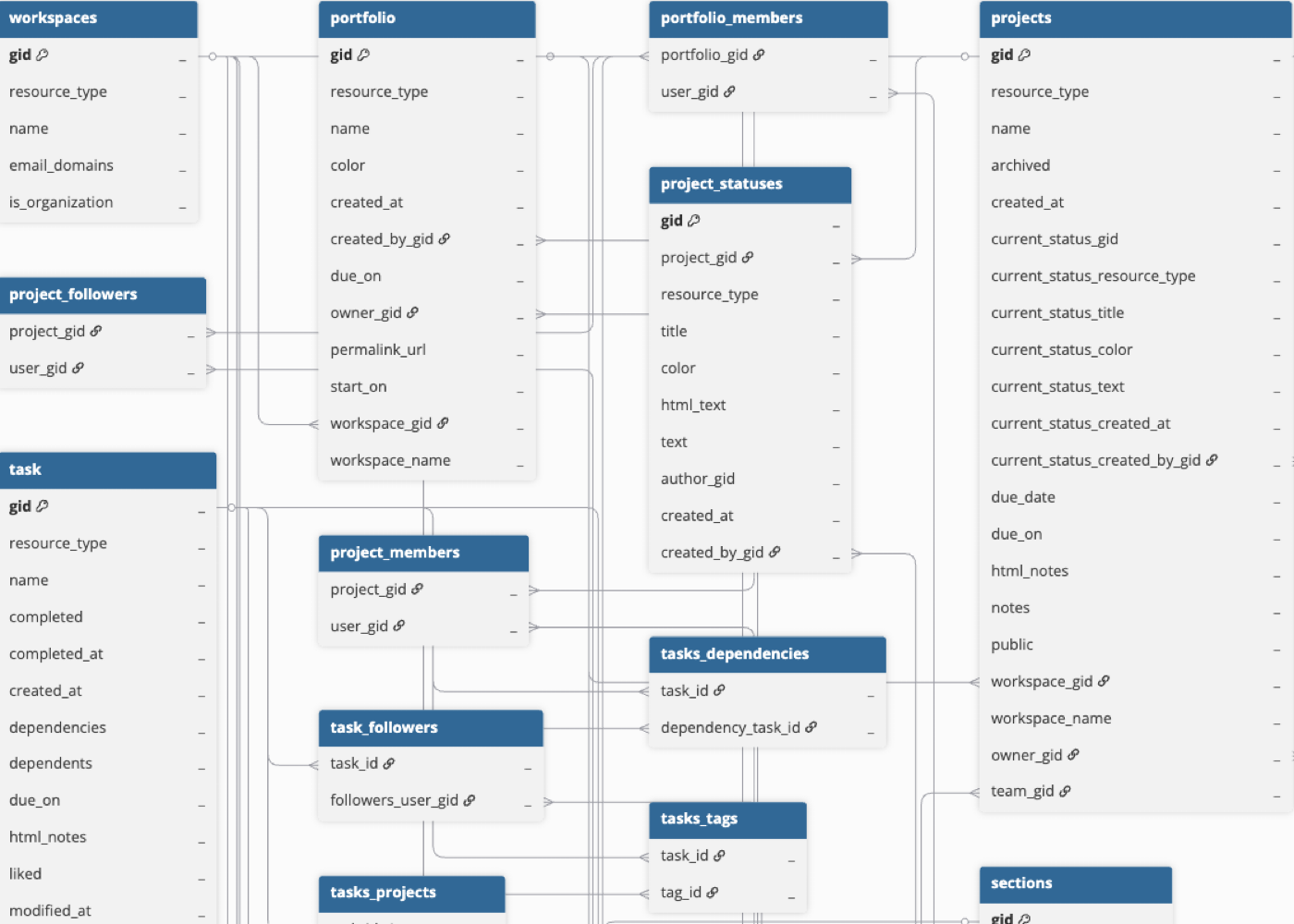Asana is a project management tool that helps you to organize, track, and manage your work.
You can replicate the data from your Asana account to a Destination database or Data Warehouse using Hevo Pipelines.
Prerequisites
Configuring Asana as a Source
Perform the following steps to configure Asana as the Source in your Pipeline:
-
Click PIPELINES in the Navigation Bar.
-
Click + Create Pipeline in the Pipelines List View.
-
In the Select Source Type page, select Asana.
-
On the Select Destination Type page, select the type of Destination you want to use.
-
In the Configure your Asana account page, do one of the following:
-
In the Configure your Asana Source page, specify the following:

-
Pipeline Name: A unique name for your Pipeline, not exceeding 255 characters.
-
Select Projects: Select at least one project whose data you would like to ingest.
-
Historical Sync Duration: The duration for which you want to ingest the existing data from the Source. Default duration: 6 Months.
Note: If you select All Available Data, Hevo ingests all the data available in your Asana account since January 01, 1970.
-
Click Test & Continue.
-
Proceed to configuring the data ingestion and setting up the Destination.
Data Replication
| For Teams Created |
Default Ingestion Frequency |
Minimum Ingestion Frequency |
Maximum Ingestion Frequency |
Custom Frequency Range (in Hrs) |
| Before Release 2.21 |
1 Hr |
5 Mins |
24 Hrs |
1-24 |
| After Release 2.21 |
6 Hrs |
30 Mins |
24 Hrs |
1-24 |
Note: The custom frequency must be set in hours as an integer value. For example, 1, 2, or 3, but not 1.5 or 1.75.
-
Historical Data: The first run of the Pipeline ingests historical data for the selected objects on the basis of the historical sync duration specified at the time of creating the Pipeline and loads it to the Destination. Default duration: 6 Months.
-
Incremental Data: Once the historical load is complete, all new and updated records for the Tasks object are ingested as per the ingestion frequency. The remaining objects are ingested in Full Load mode.
Schema and Primary Keys
Hevo uses the following schema to upload the records in the Destination database. For a detailed view of the objects, fields, and relationships, click the ERD.
Data Model
The following is the list of tables (objects) that are created at the Destination when you run the Pipeline:
Note: All objects other than Tasks are Full Load objects.
| Object |
Description |
| Portfolios |
Contains an overview of the state of multiple projects, including a progress report and the most recent project status update. |
| Portfolio Items |
Contains the list of the projects in a portfolio. |
| Projects |
Contains the prioritized list of tasks in Asana or a board with columns of tasks represented as cards. A project is specific to an organization or workspace. |
| Project Followers |
Contains a list of users following a project. Followers are the users who have opted in to receive tasks added notifications for a project. |
| Project Members |
Contains the list of users who are members of the project. |
| Project Statuses |
Contains the history of project status changes. |
| Sections |
Contains a group of tasks within a project. It can either be a header above a list of tasks in a list view or a column in a board view of a project. |
| Tags |
Contains the list of labels that can be attached to task in Asana. A tag is specific to an organization or workspace. |
| Tags Followers |
Contains the list of users following a tag. |
| Tasks |
Contains the list of different operations performed in Asana. |
| Tasks Custom Fields |
Contains the list of custom field values applied to the task. |
| Tasks Dependencies |
Contains the list of resources referencing tasks that a particular task depends on. The objects contain only the Global Identifier (GID) of the dependency. |
| Tasks Dependents |
Contains the IDs of the resources that depend on the task. |
| Tasks Followers |
Contains the list of users following the task. |
| Tasks Memberships |
Contains the list of projects that a task is associated with and the section it belongs to. At task creation time, this list can be used to add the task to specific sections. |
| Tasks Tags |
Contains the list of tags associated with the task. |
| Teams |
Contains the groups of related projects and people within an organization. |
| Users |
Contains the list of accounts in Asana that can be given access to various workspaces, projects, and tasks. |
| Workspaces |
Contains the list of projects and tasks that are associated with the workspace. |
Read the detailed Hevo documentation for the following related topics:
Limitations
-
Portfolios are only available for Premium and Business plans in Asana.
-
The Stories object is not included in the schema due to API limitations.
-
Hevo does not track any deletes for the Asana objects. Please reach out to Hevo Support if required.
-
Hevo does not load data from a column into the Destination table if its size exceeds 16 MB, and skips the Event if it exceeds 40 MB. If the Event contains a column larger than 16 MB, Hevo attempts to load the Event after dropping that column’s data. However, if the Event size still exceeds 40 MB, then the Event is also dropped. As a result, you may see discrepancies between your Source and Destination data. To avoid such a scenario, ensure that each Event contains less than 40 MB of data.
See Also
Revision History
Refer to the following table for the list of key updates made to this page:
| Date |
Release |
Description of Change |
| Nov-11-2025 |
NA |
Updated the document as per the latest Hevo UI. |
| Sep-18-2025 |
NA |
Updated section, Configuring Asana as a Source as per the latest UI. |
| Jul-07-2025 |
NA |
Updated the Limitations section to inform about the max record and column size in an Event. |
| Jan-07-2025 |
NA |
Updated the Limitations section to add information on Event size. |
| Mar-05-2024 |
2.21 |
Added the ingestion frequency table in the Data Replication section. |
| Apr-04-2023 |
NA |
Updated section, Configuring Asana as a Source to update the information about historical sync duration. |
| Dec-07-2022 |
NA |
Updated section, Data Replication to reorganize the content for better understanding and coherence. |
| Sep-07-2022 |
NA |
Updated section, Data Model to remove object Project Custom Fields as Hevo does not support it. |
| Jan-03-2022 |
1.79 |
New document. |


